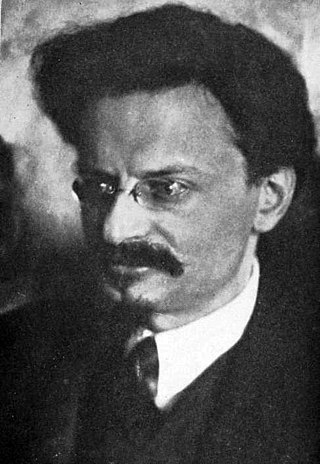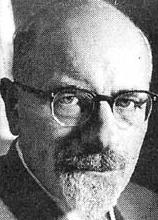
Lev Davidovich Bronstein, better known as Leon Trotsky, was a Russian revolutionary, Soviet politician, and political theorist. He was a central figure in the 1905 Revolution, October Revolution of 1917, Russian Civil War, and establishment of the Soviet Union, from which he was exiled in 1929 before his assassination in 1940. Trotsky and Vladimir Lenin were widely considered the two most prominent Soviet figures from 1917 until Lenin's death in 1924. Ideologically a Marxist and a Leninist, Trotsky's ideas inspired a school of Marxism known as Trotskyism.

Leninism is a political ideology developed by Russian Marxist revolutionary Vladimir Lenin that proposes the establishment of the dictatorship of the proletariat led by a revolutionary vanguard party as the political prelude to the establishment of communism. Lenin's ideological contributions to the Marxist ideology relate to his theories on the party, imperialism, the state, and revolution. The function of the Leninist vanguard party is to provide the working classes with the political consciousness and revolutionary leadership necessary to depose capitalism.

Stalinism is the totalitarian means of governing and Marxist–Leninist policies implemented in the Soviet Union (USSR) from 1924 to 1953 by dictator Joseph Stalin and in Soviet satellite states between 1944 and 1953. Stalinism included the creation of a one man totalitarian police state, rapid industrialization, the theory of socialism in one country, forced collectivization of agriculture, intensification of class conflict, a cult of personality, and subordination of the interests of foreign communist parties to those of the Communist Party of the Soviet Union, which Stalinism deemed the leading vanguard party of communist revolution at the time. After Stalin's death and the Khrushchev Thaw, a period of de-Stalinization began in the 1950s and 1960s, which caused the influence of Stalin's ideology to begin to wane in the USSR.

Trotskyism is the political ideology and branch of Marxism developed by Russian revolutionary and intellectual Leon Trotsky along with some other members of the Left Opposition and the Fourth International. Trotsky described himself as an orthodox Marxist, a revolutionary Marxist, and a Bolshevik–Leninist as well as a follower of Karl Marx, Frederick Engels, Vladimir Lenin, Karl Liebknecht, and Rosa Luxemburg. His relations with Lenin have been a source of intense historical debate. However, on balance, scholarly opinion among a range of prominent historians and political scientists such as E.H. Carr, Isaac Deutscher, Moshe Lewin, Ronald Suny, Richard B. Day and W. Bruce Lincoln was that Lenin’s desired “heir” would have been a collective responsibility in which Trotsky was placed in "an important role and within which Stalin would be dramatically demoted ".

The Fourth International (FI) was a political international established in France in 1938 by Leon Trotsky and his supporters, having been expelled from the Soviet Union and the Communist International.

Isaac Deutscher was a Polish Marxist writer, journalist and political activist who moved to the United Kingdom before the outbreak of World War II. He is best known as a biographer of Leon Trotsky and Joseph Stalin and as a commentator on Soviet affairs.
New class is a polemic term by critics of countries that followed the Soviet-type state socialism to describe the privileged ruling class of bureaucrats and Communist party functionaries which arose in these states. Generally, the group known in the Soviet Union as the nomenklatura conforms to the theory of the new class. The term was earlier applied to other emerging strata of the society. Milovan Đilas' new-class theory was also used extensively by anti-communist commentators in the Western world in their criticism of the Communist states during the Cold War.

Lenin's Testament is a document dictated by Vladimir Lenin in late 1922 and early 1923. In the testament, Lenin proposed changes to the structure of the Soviet governing bodies. Sensing his impending death, he also criticised Bolshevik leaders Zinoviev, Kamenev, Trotsky, Bukharin, Pyatakov, and Stalin. He warned of the possibility of a split developing in the party leadership between Trotsky and Stalin if proper measures were not taken to prevent it. In a post-script of dubious origin, it is also suggested Joseph Stalin be removed from his position as General Secretary of the Russian Communist Party's Central Committee. Although there are some historical questions regarding the document's origins, the majority view is that the document was authored by Lenin.

Brian Leonard Pearce was a British Marxist political activist, historian, and translator. Adept and prolific in Russian-to-English translation, Pearce was regarded at the time of his death as "one of the most acute scholars of Russian history and British communism never to have held an academic post."

Pyotr Nikolayevich Pospelov was a high-ranked functionary of the Communist Party of the Soviet Union, propagandist, academician of the USSR Academy of Sciences (1953), chief editor of Pravda newspaper, and director of the Institute of Marxism-Leninism. He was known as a staunch Stalinist who quickly became a supporter of Nikita Khrushchev.

History of the Russian Revolution is a three-volume book by Leon Trotsky on the Russian Revolution of 1917. The first volume is dedicated to the political history of the February Revolution and the October Revolution, to explain the relations between these two events. The book was initially published in Germany in 1930. It was originally published in Russian, but it was translated into English by Max Eastman in 1932. The English translation of the second volume, originally consisting of two parts, is split into two volumes. The book was considered anti-Stalinist in the Soviet Union and was not published in Russia until 1997.
The Left Opposition was a faction within the Russian Communist Party (Bolsheviks) from 1923 to 1927 headed de facto by Leon Trotsky. It was formed by Trotsky to mount a struggle against the perceived bureaucratic degeneration within the party leadership headed by Stalin during the serious illness of the Bolshevik founder Vladimir Lenin and after Lenin's death in January 1924. The Left Opposition advocated for a programme of rapid industrialization, voluntary collectivisation of agriculture, and the expansion of a worker's democracy.

Livio Maitan was an Italian Trotskyist, a leader of Associazione Bandiera Rossa and of the Fourth International. He was born in Venice.

Ernest Ezra Mandel, also known by various pseudonyms such as Ernest Germain, Pierre Gousset, Henri Vallin, Walter, was a Belgian Marxian economist, Trotskyist activist and theorist, and Holocaust survivor. He fought in the underground resistance against the Nazis during the occupation of Belgium.
Socialism in one country was a Soviet state policy to strengthen socialism within the country rather than socialism globally. Given the defeats of the 1917–1923 European communist revolutions, Joseph Stalin developed and encouraged the theory of the possibility of constructing socialism in the Soviet Union alone. The theory was eventually adopted as Soviet state policy.

Trotsky: A Biography is a biography of the Marxist theorist and revolutionary Leon Trotsky (1879–1940) written by the English historian Robert Service, then a professor in Russian history at the University of Oxford. It was first published by Macmillan in 2009 and later republished in other languages.
The anti-Stalinist left encompasses various kinds of Marxist political movements that oppose Joseph Stalin, Stalinism, Neo-Stalinism and the system of governance that Stalin implemented as leader of the Soviet Union between 1924 and 1953. This term also refers to the high ranking political figures and governmental programs that opposed Joseph Stalin and his form of communism, such as Leon Trotsky and other traditional Marxists within the Left Opposition. In Western historiography, Stalin is considered one of the worst and most notorious figures in modern history.

Foundations of Leninism was a 1924 collection made by Joseph Stalin that consisted of nine lectures he delivered at Sverdlov University that year. It was published by the Soviet newspaper, Pravda.
The Permanent Revolution and Results and Prospects is a 1930 book published by Bolshevik-Soviet politician and former head of The Red Army Leon Trotsky. It was first published by the Left Opposition in the Russian language in Germany in 1930. The book was translated into English by John G. Wright and published by New Park Publications in 1931.
The Struggle Against Fascism in Germany is a 1971 compilation book based on the writings of Russian revolutionary, Leon Trotsky on the origin of fascism; his early warnings on Nazi Germany, his views on the Comintern, and his tactical support for a united front.














